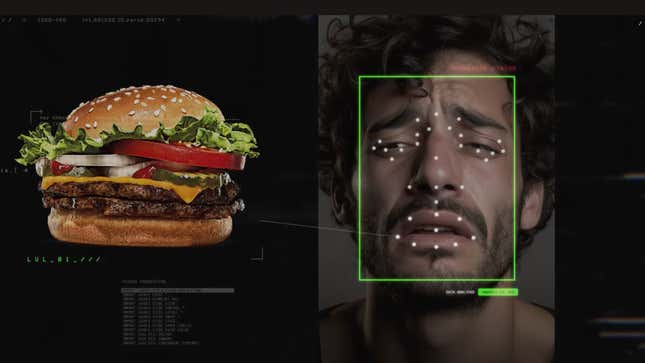
The Brazilian wing of Burger King announced a surveillance technology marketing stunt this week called the “Hangover Whopper,” celebrating the booze-filled days between Christmas and New Year’s with facial recognition. All you have to do is hold your bleary-eyed visage up to a camera, and the company says its face-scanning software will judge how hungover you look and hand out a corresponding coupon. Welcome to the future: a boring dystopia where the most nightmarish technology is just another cutesy promotional tool.
Burger King announced the campaign with a video spotted by Marketing Dive. “At the end of the year, it’s Friday every day, and the hangover kicks in,” a vaguely robotic voice says as images of cheeseburgers glitch in and out over fake computer code. “BK presents Hangover Whopper, a technology that scans your hangover level and offers a discount on the ideal combo to help combat it.” The stunt runs until January 2nd.
Waking up in a post-Christmas haze after one too many glasses of wine, I was the perfect test subject for this Orwellian fast-food gimmick. The discounts only work on delivery orders in Brazil, but the face-scanning happens in the company’s mobile app, as well as a dedicated website (the site only worked on mobile devices when I tried it). I gave the website permission to access my iPhone camera and posed for a photo. The Burger King software thought for a second, and then recommended the Double Whopper Jr. That’s only a one on the hangover scale — tell that to my headache — but I did earn a little discount for my privacy sacrifice: a coupon code for R$3.00, or about $0.62 in American dollars.
For the last decade, advocates raised alarms over the creeping spread of facial recognition, a technology that promises to destroy the few remaining shreds of privacy we have left. Just last week, the FTC banned Rite Aid from using facial recognition for five years after an investigation found the drugstore used a lazy implementation of the technology to falsely accuse thousands of people of shoplifting, including one incident involving an 11-year-old girl. But for the most part, the spies won. Today, facial recognition is everywhere, and as you move through public spaces, you are constantly under the prying watch of cameras running the tech.
Here’s the thing about facial recognition: it barely works. The technology does a passable though not 100% accurate job with the faces of white men, but numerous studies show it’s far less accurate at identifying Black, Asian, Latino, and female faces. It’s also functionally useless for other things like measuring your emotions, detecting political affiliations, or finding you a date, despite the dozens of companies promising digital phrenology. It’s probably no good for detecting hangovers either, and if you dig a little, Burger King seems to admit that.
Burger King did not immediately respond to a request for comment.
According to the Portuguese privacy policy on the Hangover Whopper website (which begins, “Even with a hangover, I declare...”), Burger King describes the system as a “fictitious assessment of the level of your hangover.” In other words, it may not be measuring anything. The good news is the company says it’s not doing anything creepy with your data, either. Burger King promises not to share your photos with any third parties and says it won’t use them for advertising or any purposes other than running the hangover tool.
Considering the face one makes when trying to really emphasize a hangover, let’s hope these photos are properly disposed of.